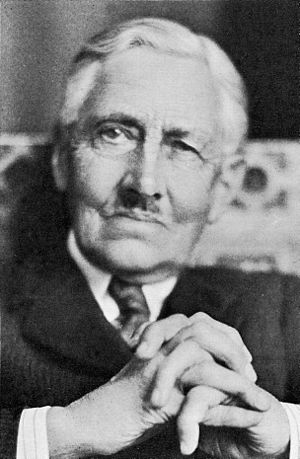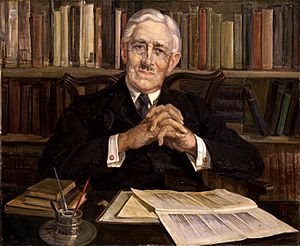Truby King facts for kids
Quick facts for kids
Sir Truby King
|
|
|---|---|
 |
|
| Born |
Frederic Truby King
1 April 1858 New Plymouth, New Zealand
|
| Died | 10 February 1938 (aged 79) Wellington, New Zealand
|
| Occupation | Bank clerk, asylum superintendent, child health reformer |
| Known for | Founder of Plunket Society |
| Parents |
|
| Relatives | Newton King (brother) |
Sir Frederic Truby King (born April 1, 1858 – died February 10, 1938) was a famous health reformer from New Zealand. He is best known for starting the Plunket Society, which helps babies and young children.
Contents
Early Life and Education
Frederic Truby King was born in New Plymouth, New Zealand, on April 1, 1858. His father was Thomas King and his mother was Mary King. His brother, Newton King, became a successful businessman.
Truby King was a very good student. After working briefly as a bank clerk, he decided to study medicine. He traveled to Edinburgh and Paris to learn more. In 1886, he became a doctor with high honors. He also earned a science degree in Public Health. While studying, he married Isabella Cockburn Miller. Later, Truby and Isabella King adopted a baby girl named Esther Loreena, who became known as Mary King.
Medical Career
In 1887, while still in Scotland, King worked as a surgeon at two hospitals. He then returned to New Zealand. From 1888 to 1889, he was a medical leader at Wellington General Hospital.
In 1889, he moved to Dunedin. There, he became the Medical Superintendent at the Seacliff Lunatic Asylum. He also taught about mental health at the University of Otago. At Seacliff, he made many positive changes. He improved patient diets and the hospital farm. He also introduced a new "villa" style of treatment. This meant smaller, more open wards for patients. His ideas were very successful and helped many people.
Focus on Infant Health
Truby King became very interested in how good food helps people stay healthy. He visited Japan during a war and noticed how healthy the babies were. This was because they were breastfed for a long time.
When he returned, he saw that many babies in boarding homes were not well cared for. This made him want to create a better place for them. He set up a special boarding facility at his home in Karitane.
Founding the Plunket Society
Truby King is most famous for starting the Plunket Society on May 14, 1907. This society was created to use scientific ideas to help feed and care for babies.
King taught mothers about good hygiene and childcare. He wrote a book called Feeding and Care of Baby. His wife, Isabella, also wrote a newspaper column called Our babies. The society trained special Karitane nurses to help mothers. King's methods focused on regular feeding, sleeping, and bowel movements for babies. He believed this strict routine helped build character.
The Plunket Society's work helped lower infant mortality (the number of babies who die) in New Zealand. In 1907, 88 out of every 1,000 babies died. Thirty years later, this number dropped to 32 out of 1,000. Many believe this was due to the society raising awareness about good childcare.
Public Service and Recognition
In 1913, King represented New Zealand at a Child Welfare Conference in London. He was asked to help set up a child health service in Britain. In 1917, Lady Victoria Plunket, whose husband was a former Governor of New Zealand, invited him to London. He helped create an infant welfare center there, which later became the Mothercraft Training Society.
After World War I, he helped with war relief efforts in Europe. Back in New Zealand, King became the Director of Child Welfare in 1921. By 1925, he was also the Inspector-General of Mental Hospitals. He worked to improve mental hospital services until he retired in 1927.
His important work was recognized with several awards. He received the CMG in 1917 and a knighthood in 1925, making him "Sir" Truby King. In 1935, he was given the King George V Silver Jubilee Medal.
Later Years and Legacy
Sir Truby King passed away in Wellington on February 10, 1938. He was given a state funeral, which is a special honor usually reserved for important public figures.
Twenty years later, he became the first New Zealander to be featured on a New Zealand postage stamp. His baby care methods remained popular for many years, even in Britain.
Today, several places are named after him. These include:
- Truby King Street in New Plymouth.
- Truby King Crescent in Dunedin.
- Truby King Drive in Waikouaiti.
- Truby King Recreation Reserve in Seacliff.
- Truby King Park in Wellington, which includes his mausoleum.
In Australia, some maternal and child health centers were also named after Truby King in the 1920s, 30s, and 40s. One of these centers in Coburg, Melbourne, is now a protected heritage building.
 | Chris Smalls |
 | Fred Hampton |
 | Ralph Abernathy |


